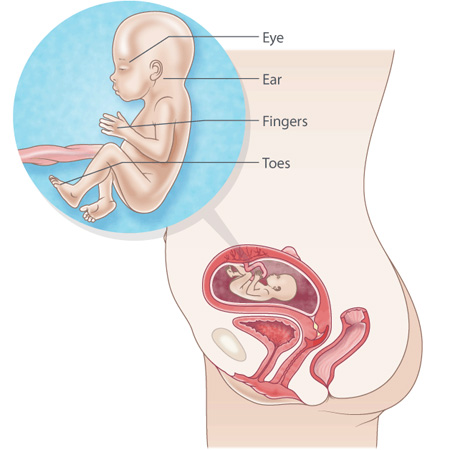
Pregnancy Week 18: A Journey of Growth and Transformation
At the 18th week of pregnancy, you have officially entered the second trimester, a period of significant growth and development for both you and your baby. This week marks the halfway point of your pregnancy, and your body and baby are undergoing remarkable changes.
Your Baby’s Development
- Size and Appearance: Your baby is now about the size of a bell pepper, measuring approximately 5.5 inches in length and weighing around 7 ounces. Their head is still disproportionately large, but their body is beginning to fill out.
- Facial Features: Your baby’s facial features are becoming more defined. Their eyes are now open, and their eyelids are starting to move. Their nose and lips are also becoming more prominent.
- Movement: Your baby is becoming increasingly active and may start to kick or punch. These movements, known as quickening, can be felt by the mother around this time.
- Bones and Muscles: Your baby’s bones are hardening, and their muscles are developing rapidly. They are now able to make small movements, such as flexing their arms and legs.
- Internal Organs: Your baby’s internal organs are continuing to develop. Their kidneys are now functioning, and they are producing urine. Their liver is also producing bile, which is essential for digestion.
Your Body’s Changes
- Uterus: Your uterus has grown significantly and is now about the size of a grapefruit. It is rising out of your pelvis and into your abdomen.
- Abdomen: Your abdomen is starting to show, and you may notice a small bump. Your waistline is disappearing, and your hips are widening.
- Breasts: Your breasts are continuing to grow and may become tender or sore. Your nipples are also becoming darker and larger.
- Skin: Your skin may become darker, especially in areas such as your face, nipples, and underarms. You may also develop stretch marks on your abdomen, breasts, and thighs.
- Hair: Your hair may become thicker and shinier during pregnancy due to increased levels of hormones.
- Weight Gain: You should have gained between 10 and 15 pounds by this week. Your weight gain will continue steadily throughout the rest of your pregnancy.
Common Symptoms
- Fatigue: Fatigue is a common symptom during pregnancy, especially in the first and third trimesters.
- Nausea and Vomiting: Morning sickness typically subsides by this week, but some women may still experience occasional nausea or vomiting.
- Constipation: Constipation is a common problem during pregnancy due to hormonal changes and increased pressure on the intestines.
- Heartburn: Heartburn is another common symptom of pregnancy, caused by the relaxation of the valve between the stomach and esophagus.
- Frequent Urination: As your uterus grows, it puts pressure on your bladder, leading to frequent urination.
- Back Pain: Back pain is a common complaint during pregnancy, especially as your abdomen grows.
Prenatal Care
- Prenatal Appointment: You will likely have a prenatal appointment this week. Your doctor will check your weight, blood pressure, and urine. They will also listen to your baby’s heartbeat and perform an ultrasound to monitor your baby’s growth and development.
- Blood Tests: Your doctor may order blood tests to check your blood sugar levels, iron levels, and other health markers.
- Ultrasound: An ultrasound can provide detailed images of your baby and the placenta. It can also help determine your baby’s gender, if you wish to know.
Lifestyle Tips
- Eat a Healthy Diet: Eating a healthy diet is essential for both you and your baby. Focus on consuming plenty of fruits, vegetables, whole grains, and lean protein.
- Exercise Regularly: Regular exercise is safe and beneficial during pregnancy. Choose activities that are low-impact and comfortable for you.
- Get Enough Sleep: Getting enough sleep is important for your overall health and well-being. Aim for 7-9 hours of sleep per night.
- Avoid Alcohol and Smoking: Alcohol and smoking are harmful to your baby. Avoid these substances throughout your pregnancy.
- Manage Stress: Stress can have a negative impact on your pregnancy. Find healthy ways to manage stress, such as yoga, meditation, or spending time in nature.
Emotional Changes
During the second trimester, you may experience a range of emotions, including:
- Excitement: You may feel excited and eager to meet your baby.
- Anxiety: It is normal to feel some anxiety about pregnancy and childbirth. Talk to your doctor or a trusted friend or family member if you are feeling overwhelmed.
- Mood Swings: Hormonal changes during pregnancy can lead to mood swings. Don’t be surprised if you feel happy one moment and sad or irritable the next.
- Increased Libido: Some women experience an increased libido during pregnancy. This is due to increased blood flow to the pelvic area.
Conclusion
Pregnancy week 18 is a time of significant growth and transformation for both you and your baby. Your body is changing rapidly, and your baby is developing at an astonishing pace. By following a healthy lifestyle, attending prenatal appointments, and managing your emotions, you can ensure a safe and healthy pregnancy for both of you.